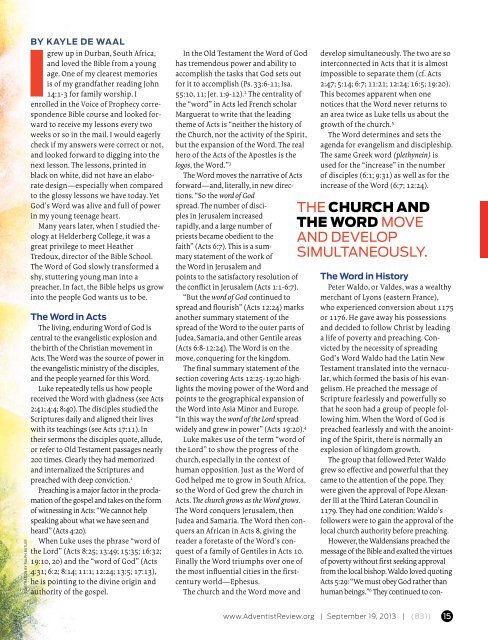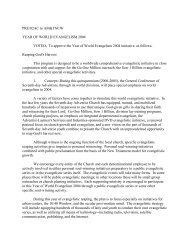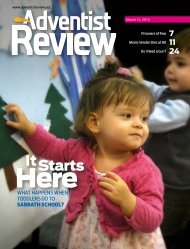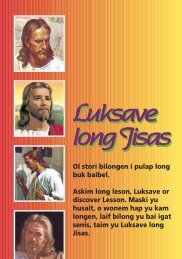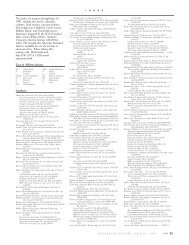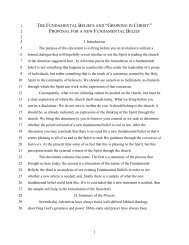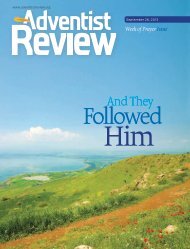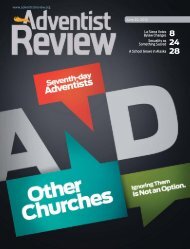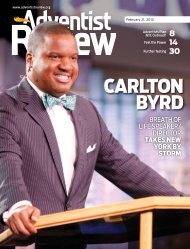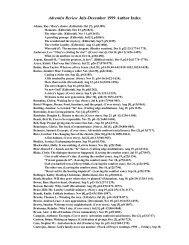Download PDF - Adventist Review
Download PDF - Adventist Review
Download PDF - Adventist Review
- No tags were found...
You also want an ePaper? Increase the reach of your titles
YUMPU automatically turns print PDFs into web optimized ePapers that Google loves.
I<br />
grew up in Durban, South Africa,<br />
and loved the Bible from a young<br />
age. One of my clearest memories<br />
is of my grandfather reading John<br />
14:1-3 for family worship. I<br />
enrolled in the Voice of Prophecy correspondence<br />
Bible course and looked forward<br />
to receive my lessons every two<br />
weeks or so in the mail. I would eagerly<br />
check if my answers were correct or not,<br />
and looked forward to digging into the<br />
next lesson. The lessons, printed in<br />
black on white, did not have an elaborate<br />
design—especially when compared<br />
to the glossy lessons we have today. Yet<br />
God’s Word was alive and full of power<br />
in my young teenage heart.<br />
Many years later, when I studied theology<br />
at Helderberg College, it was a<br />
great privilege to meet Heather<br />
Tredoux, director of the Bible School.<br />
The Word of God slowly transformed a<br />
shy, stuttering young man into a<br />
preacher. In fact, the Bible helps us grow<br />
into the people God wants us to be.<br />
illustration by ralph butler<br />
BY KAYLE DE WAAL<br />
The Word in Acts<br />
The living, enduring Word of God is<br />
central to the evangelistic explosion and<br />
the birth of the Christian movement in<br />
Acts. The Word was the source of power in<br />
the evangelistic ministry of the disciples,<br />
and the people yearned for this Word.<br />
Luke repeatedly tells us how people<br />
received the Word with gladness (see Acts<br />
2:41; 4:4; 8:40). The disciples studied the<br />
Scriptures daily and aligned their lives<br />
with its teachings (see Acts 17:11). In<br />
their sermons the disciples quote, allude,<br />
or refer to Old Testament passages nearly<br />
200 times. Clearly they had memorized<br />
and internalized the Scriptures and<br />
preached with deep conviction. 1<br />
Preaching is a major factor in the proclamation<br />
of the gospel and takes on the form<br />
of witnessing in Acts: “We cannot help<br />
speaking about what we have seen and<br />
heard” (Acts 4:20).<br />
When Luke uses the phrase “word of<br />
the Lord” (Acts 8:25; 13:49; 15:35; 16:32;<br />
19:10, 20) and the “word of God” (Acts<br />
4:31; 6:2; 8:14; 11:1; 12:24; 13:5; 17:13),<br />
he is pointing to the divine origin and<br />
authority of the gospel.<br />
In the Old Testament the Word of God<br />
has tremendous power and ability to<br />
accomplish the tasks that God sets out<br />
for it to accomplish (Ps. 33:6-11; Isa.<br />
55:10, 11; Jer. 1:9-12). 2 The centrality of<br />
the “word” in Acts led French scholar<br />
Marguerat to write that the leading<br />
theme of Acts is “neither the history of<br />
the Church, nor the activity of the Spirit,<br />
but the expansion of the Word. The real<br />
hero of the Acts of the Apostles is the<br />
logos, the Word.” 3<br />
The Word moves the narrative of Acts<br />
forward—and, literally, in new directions.<br />
“So the word of God<br />
spread. The number of disciples<br />
in Jerusalem increased<br />
rapidly, and a large number of<br />
priests became obedient to the<br />
faith” (Acts 6:7). This is a summary<br />
statement of the work of<br />
the Word in Jerusalem and<br />
points to the satisfactory resolution of<br />
the conflict in Jerusalem (Acts 1:1-6:7).<br />
“But the word of God continued to<br />
spread and flourish” (Acts 12:24) marks<br />
another summary statement of the<br />
spread of the Word to the outer parts of<br />
Judea, Samaria, and other Gentile areas<br />
(Acts 6:8-12:24). The Word is on the<br />
move, conquering for the kingdom.<br />
The final summary statement of the<br />
section covering Acts 12:25-19:20 highlights<br />
the moving power of the Word and<br />
points to the geographical expansion of<br />
the Word into Asia Minor and Europe.<br />
“In this way the word of the Lord spread<br />
widely and grew in power” (Acts 19:20). 4<br />
Luke makes use of the term “word of<br />
the Lord” to show the progress of the<br />
church, especially in the context of<br />
human opposition. Just as the Word of<br />
God helped me to grow in South Africa,<br />
so the Word of God grew the church in<br />
Acts. The church grows as the Word grows.<br />
The Word conquers Jerusalem, then<br />
Judea and Samaria. The Word then conquers<br />
an African in Acts 8, giving the<br />
reader a foretaste of the Word’s conquest<br />
of a family of Gentiles in Acts 10.<br />
Finally the Word triumphs over one of<br />
the most influential cities in the firstcentury<br />
world—Ephesus.<br />
The church and the Word move and<br />
develop simultaneously. The two are so<br />
interconnected in Acts that it is almost<br />
impossible to separate them (cf. Acts<br />
2:47; 5:14; 6:7; 11:21; 12:24; 16:5; 19:20).<br />
This becomes apparent when one<br />
notices that the Word never returns to<br />
an area twice as Luke tells us about the<br />
growth of the church. 5<br />
The Word determines and sets the<br />
agenda for evangelism and discipleship.<br />
The same Greek word (plethynein) is<br />
used for the “increase” in the number<br />
of disciples (6:1; 9:31) as well as for the<br />
increase of the Word (6:7; 12:24).<br />
The church and<br />
the Word move<br />
and develop<br />
simultaneously.<br />
The Word in History<br />
Peter Waldo, or Valdes, was a wealthy<br />
merchant of Lyons (eastern France),<br />
who experienced conversion about 1175<br />
or 1176. He gave away his possessions<br />
and decided to follow Christ by leading<br />
a life of poverty and preaching. Convicted<br />
by the necessity of spreading<br />
God’s Word Waldo had the Latin New<br />
Testament translated into the vernacular,<br />
which formed the basis of his evangelism.<br />
He preached the message of<br />
Scripture fearlessly and powerfully so<br />
that he soon had a group of people following<br />
him. When the Word of God is<br />
preached fearlessly and with the anointing<br />
of the Spirit, there is normally an<br />
explosion of kingdom growth.<br />
The group that followed Peter Waldo<br />
grew so effective and powerful that they<br />
came to the attention of the pope. They<br />
were given the approval of Pope Alexander<br />
III at the Third Lateran Council in<br />
1179. They had one condition: Waldo’s<br />
followers were to gain the approval of the<br />
local church authority before preaching.<br />
However, the Waldensians preached the<br />
message of the Bible and exalted the virtues<br />
of poverty without first seeking approval<br />
from the local bishop. Waldo loved quoting<br />
Acts 5:29: “We must obey God rather than<br />
human beings.” 6 They continued to con-<br />
www.<strong>Adventist</strong><strong>Review</strong>.org | September 19, 2013 | (831) 15


